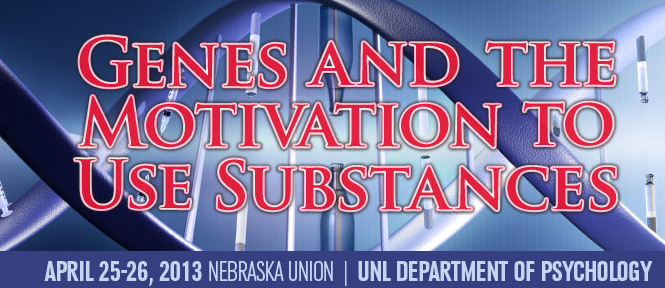
Many people use substances, but a relatively small percentage develop substance use disorders. Why this happens is an active area of research that will be explored April 25-26 at the 61st annual Nebraska Symposium on Motivation at UNL.
The symposium’s theme this year is “Genes and the Motivation to Use Substances.” Six experts will present research findings on various topics on the motivation of substance use and addictive behavior.
Scott Stoltenberg, assistant professor of psychology at UNL, is coordinating the symposium. He said the long-running symposium looks motivation’s role in human behavior and this year will delve into the incentives to use substances and the risks of developing a disorder.
“There is no question that humans are motivated to use substances, such as alcohol, tobacco or marijuana,” Stoltenberg said. “Nearly all of us have used substances at some time in our lives and many of us use them regularly. Sizeable minorities of people develop a substance use disorder that is, at least in part, characterized by impaired control over use of the substance.
“In other words, when people are motivated to quit using the substance they have trouble doing so,” he said. “Most of us don’t develop a substance use disorder and so the question arises: Are there underlying genetic differences between those that develop a problem with substances and those who don’t? The short answer is yes.”
Stoltenberg said that in the past two decades, genetic research on substance use disorders has grown tremendously, providing evidence that genetic factors influence a person’s motivation to use substances and the risk for developing disorders.
“There is no single gene that causes addiction, but there are many genes that have some influence, along with certain environments,” he said. “This symposium will examine what is currently known about the role that genes play in the motivation to use substances and the risk for developing a disorder.”
The event is free and open to the public. While the presentations are scientific, Stoltenberg said the public could gain new insights into addiction.
“There is a lot of curiosity about how genes might contribute to a person’s vulnerability to addiction,” he said. “Nearly everyone knows someone who has suffered with a substance use problem. I think the public will gain an appreciation for the amount of research that has been conducted in the area. We know a lot more about the causes of addiction than we did just a few years ago.”
The symposium will be in the Nebraska Union, 14th and R streets. A full schedule, list of speakers and more information on the symposium – including how to register, which is suggested but not required – can be found at http://psychology.unl.edu/symposium/nebraska-symposium-motivation. The event also will be live-streamed at http://psychology.unl.edu/symposium/streaming.
More details at: http://go.unl.edu/pgd